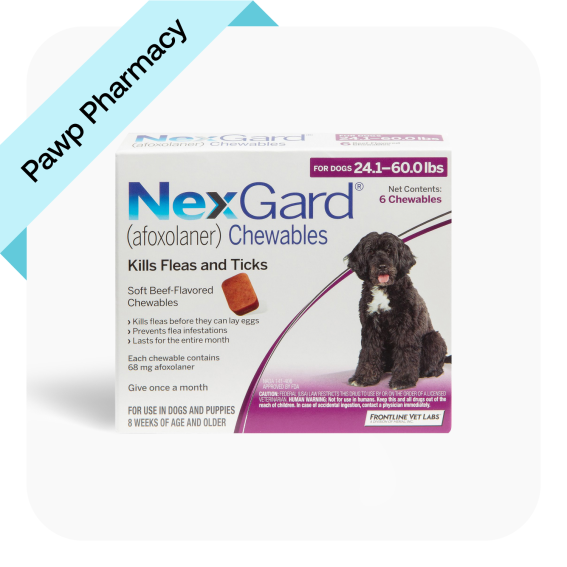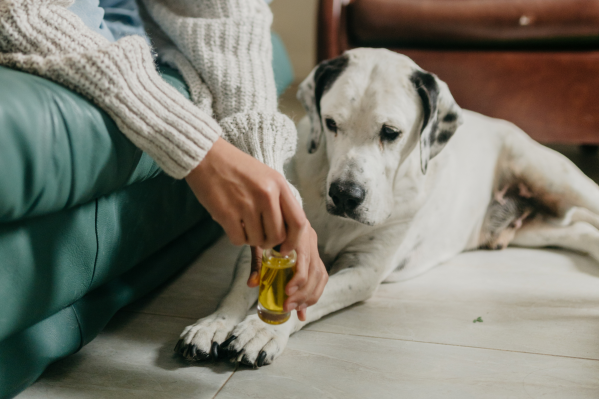Natural remedies are all the rage in the health circuit, and it’s easy to understand why. If you can use an over-the-counter remedy made of natural ingredients for your medical ailments—and they actually work—why wouldn’t you want to try that route first?
But as nice as it sounds to use only organic and pure ingredients found in nature, sometimes you need something of a higher grade to tackle the health issues you’re facing. And the same goes for your pet.
When it comes to keeping your cat or dog as healthy as possible, getting them on an effective flea and tick treatment is essential. Many pet parents wonder if they can forego the prescription flea medications and opt for a more DIY approach—essential oils. But are essential oils for fleas and ticks recommended, or even safe? Let's dive in.
Is it safe to use essential oils for fleas and ticks?
According to Jo Myers, DVM and advisor to Pawp, it is not safe to use essential oils for flea and tick treatment. In fact, applying essential oils to cats and dogs can be dangerous. Dr. Myers notes that most veterinary textbooks simply say to always keep essential oils out of reach from your pet at all costs.
“This isn’t to say that there aren’t any ‘safe’ essential oil products out there,” says Dr. Myers. “If the essential oil is present in only a very diluted fashion, for example, or isn’t a particularly toxic one, it may not make a pet sick.”
An easy way to decipher this is to read the label.
"If you’re going to use one, make sure it’s formulated specifically for use in/on dogs/cats and use it in accordance with the label instructions,” says Dr. Myers. “Keep in mind that quality control is an issue with many of these products, so you can’t have any way of knowing what is actually in the product, regardless of what it says on the label.”
Dr. Myers adds that essential oils have no proven therapeutic benefits for pets either, so there’s never a reason to use them.
“When it comes to flea and tick prevention and control, it’s important to use something that’s safe and effective. Not only do essential oils have a real problem with safety, they’re also not effective for this use case.”
How to choose the right flea and tick medication
There are many things to consider when choosing the right flea and tick medication, such as your geographic location and your pet's health and lifestyle.
“The seasonality of when you need flea/tick prevention varies by your geographic location and flea prevalence, as well as to specific issues your pet may have,” explains Dr Myers. “When considering the seasonality of your flea and tick prevention plan, it’s important to have a solid understanding of the parasite’s life cycle. With fleas, for example, it takes a minimum of three months to eliminate an existing flea population in your house. Once you take that into consideration, it’s easy to see that in most regions of the U.S., flea prevention is necessary all year round,” she says.
Ticks tend to be most prevalent at the very earliest part of spring and at the very latest part of the fall, says Dr. Myers, but they’re around all summer, too, so it’s best to work with your vet to gauge what they suggest for your pet.
Read: The Best Dog Flea & Tick Medications Of 2022
Your pet's health will also be taken into consideration when choosing a flea and tick medication. Dr. Myers says that if your pet has sensitive skin issues, they will likely need to be on a flea and tick treatment all year long.
You should always consult with a vet who understands your pet’s personal needs to get the right flea and tick medication.
In general there a few truths about choosing a flea and tick medication:
Getting an effective/high-quality product will require a prescription from your vet
You must learn how to administer the medication correctly from your vet to ensure it works properly on your pet

NexGard Chewable, 24.1-60 lbs, (Purple Box), Rx$30
If you're a Pawp member you can purchase your flea and tick medication through the Pawp Pharmacy. You will already need to have a prescription.
Do city pets still need flea and tick treatments?
Even though you might not think city pets have the chance of picking up creepy crawlers since their time in grass and parks is limited, Dr. Myers says all pets likely need some type of treatment, no matter where they live. This is especially true for flea management.
Read: Where Do Ticks Live? The Answer May Surprise You
“If your pet touches the ground or walks through environments where other mammals walk (other pets, mice, squirrels, rabbits, etc.) then they will be at risk for picking up fleas,” says Dr. Myers. “Fleas don’t spend all their time on their hosts. They hop on to a mammal to eat and mate, but then the eggs fall off into the environment to grow up there, and the adult fleas can hop off as well.”
Basically, your pet can potentially pick up fleas any time they pass through an environment where other mammals have been.
“Ticks are a different story,” says Dr. Myers. “In a sense, you only need tick prevention if your pet goes where ticks live, and that’s primarily in grassy/shrubby areas where a decent number of warm-blooded hosts (domestic or otherwise) frequently pass by,” she says.
Indoor cats are not at high risk. “They’re only likely to pick up a tick if you (or another member of the household, dogs included) carry it home,” says Dr. Myers. “It’s best to use a preventive if you want to do all you can to maximize your pet’s safety from tick borne illnesses, but if you’re not seeing ticks on your pet, a preventive is less critical.”
